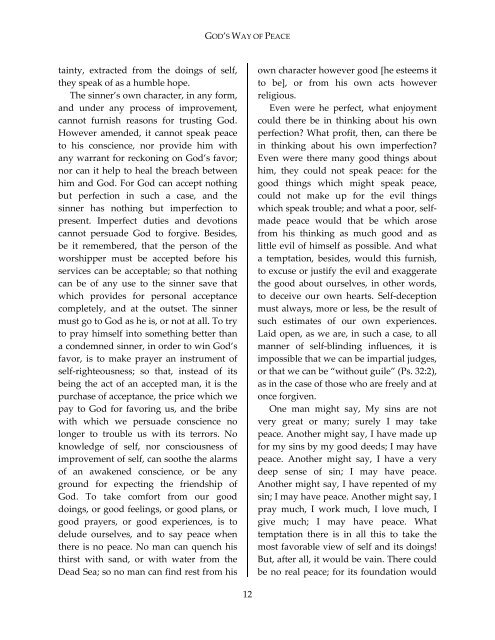God's Way of Peace by Horatius Bonar, D.D.
The seasoned Scottish pastor wrote this short devotional for those suffering from guilt, anxiety, or the consequences of sin. He writes with neither chastisement nor condemnation, but rather immediately directs his readers to Christ’s gift of salvation through his death and resurrection. Bonar reminds all that the Gospel offers hope for the sinner and comfort for the troubled, for God’s perfect, constant grace never fails those who accept it. From Bonar’s time to the present, people have found peace with God afresh through this book. Many people report having read it several times, and turning to it again and again when troubles arise. Kathleen O’Bannon CCEL Staff
The seasoned Scottish pastor wrote this short devotional for those suffering from guilt, anxiety, or the consequences of sin. He writes with neither chastisement nor condemnation, but rather immediately directs his readers to Christ’s gift of salvation through his death and resurrection. Bonar reminds all that the Gospel offers hope for the sinner and comfort for the troubled, for God’s perfect, constant grace never fails those who accept it. From Bonar’s time to the present, people have found peace with God afresh through this book. Many people report having read it several times, and turning to it again and again when troubles arise.
Kathleen O’Bannon
CCEL Staff
Create successful ePaper yourself
Turn your PDF publications into a flip-book with our unique Google optimized e-Paper software.
GOD’S WAY OF PEACE<br />
tainty, extracted from the doings <strong>of</strong> self,<br />
they speak <strong>of</strong> as a humble hope.<br />
The sinner’s own character, in any form,<br />
and under any process <strong>of</strong> improvement,<br />
cannot furnish reasons for trusting God.<br />
However amended, it cannot speak peace<br />
to his conscience, nor provide him with<br />
any warrant for reckoning on God’s favor;<br />
nor can it help to heal the breach between<br />
him and God. For God can accept nothing<br />
but perfection in such a case, and the<br />
sinner has nothing but imperfection to<br />
present. Imperfect duties and devotions<br />
cannot persuade God to forgive. Besides,<br />
be it remembered, that the person <strong>of</strong> the<br />
worshipper must be accepted before his<br />
services can be acceptable; so that nothing<br />
can be <strong>of</strong> any use to the sinner save that<br />
which provides for personal acceptance<br />
completely, and at the outset. The sinner<br />
must go to God as he is, or not at all. To try<br />
to pray himself into something better than<br />
a condemned sinner, in order to win God’s<br />
favor, is to make prayer an instrument <strong>of</strong><br />
self‐righteousness; so that, instead <strong>of</strong> its<br />
being the act <strong>of</strong> an accepted man, it is the<br />
purchase <strong>of</strong> acceptance, the price which we<br />
pay to God for favoring us, and the bribe<br />
with which we persuade conscience no<br />
longer to trouble us with its terrors. No<br />
knowledge <strong>of</strong> self, nor consciousness <strong>of</strong><br />
improvement <strong>of</strong> self, can soothe the alarms<br />
<strong>of</strong> an awakened conscience, or be any<br />
ground for expecting the friendship <strong>of</strong><br />
God. To take comfort from our good<br />
doings, or good feelings, or good plans, or<br />
good prayers, or good experiences, is to<br />
delude ourselves, and to say peace when<br />
there is no peace. No man can quench his<br />
thirst with sand, or with water from the<br />
Dead Sea; so no man can find rest from his<br />
own character however good [he esteems it<br />
to be], or from his own acts however<br />
religious.<br />
Even were he perfect, what enjoyment<br />
could there be in thinking about his own<br />
perfection? What pr<strong>of</strong>it, then, can there be<br />
in thinking about his own imperfection?<br />
Even were there many good things about<br />
him, they could not speak peace: for the<br />
good things which might speak peace,<br />
could not make up for the evil things<br />
which speak trouble; and what a poor, selfmade<br />
peace would that be which arose<br />
from his thinking as much good and as<br />
little evil <strong>of</strong> himself as possible. And what<br />
a temptation, besides, would this furnish,<br />
to excuse or justify the evil and exaggerate<br />
the good about ourselves, in other words,<br />
to deceive our own hearts. Self‐deception<br />
must always, more or less, be the result <strong>of</strong><br />
such estimates <strong>of</strong> our own experiences.<br />
Laid open, as we are, in such a case, to all<br />
manner <strong>of</strong> self‐blinding influences, it is<br />
impossible that we can be impartial judges,<br />
or that we can be “without guile” (Ps. 32:2),<br />
as in the case <strong>of</strong> those who are freely and at<br />
once forgiven.<br />
One man might say, My sins are not<br />
very great or many; surely I may take<br />
peace. Another might say, I have made up<br />
for my sins <strong>by</strong> my good deeds; I may have<br />
peace. Another might say, I have a very<br />
deep sense <strong>of</strong> sin; I may have peace.<br />
Another might say, I have repented <strong>of</strong> my<br />
sin; I may have peace. Another might say, I<br />
pray much, I work much, I love much, I<br />
give much; I may have peace. What<br />
temptation there is in all this to take the<br />
most favorable view <strong>of</strong> self and its doings!<br />
But, after all, it would be vain. There could<br />
be no real peace; for its foundation would<br />
12

















